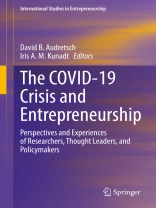2020 introduced a global pandemic that led to global economic, social, and regional lockdowns affecting public life in ways never been imagined before. This book takes a look at how researchers from fields encompassing economics and political science, along with thought leaders in business and economic policy, experienced the crises themselves as experts in their field, as well as from a personal viewpoint. Most importantly, however, it looks into the future how entrepreneurship and economic policies may change and positively influence the societies and the economy after the pandemic. Keeping in mind that, with climate change and the digital revolution, change was already around the corner and inevitable, renowned economic and policy experts are asked for their assessment of future roads and feasible economic policies. The book follows the chronology of the pandemic and focuses on leading researchers and thought leaders in public policy and business. An introduction to each chapter describes the context particular to the contributing author when the pandemic struck and their own reactions, experiences, and insights triggered by the emerging pandemic.
Table des matières
The Journey: Navigating the COVID-19 Crisis.- Part I: The Future is Risky and Entrepreneurial.- Resilience Is the New Competitive.- Depths of Change: Ranging from Clubhouse to Game Changer.- Oxygenating Innovation? The Not-So-Brave New World of COVID-19?.- Part II: Economies Under Pressure: Challenges for the Future After the COVID-19 Crisis.- COVID-19, Schumpeter, and the Size of the Market.- COVID-19 Crisis: Modernization Push at the Macroeconomic and Firm Level, Providing for Not So Disparate Opportunities and Challenges for Majors and Start-Ups.- Entrepreneurship and Economic Resilience in Times of Crisis: Insights from the COVID-19 Pandemic.- Business Angel Investing During the COVID-19 Pandemic.- Part III: Reflecting on the Future of Entrepreneurship Research: Diversity and Impact After the COVID-19 Crisis.- Dreaming of a Different Future.- Editorial Quandaries During the COVID-19 Pandemic: A Personal Exposé.- Part IV: Acting Under Uncertainty: Personal Perspectives from Sweden, Egypt and Germany.- My Experiences of the COVID-19 Pandemic So Far.- “Hibernating” in Cairo: COVID-19, as seen from Egypt.- COVID-19 Pandemic Lockdown: The Era of Connection and Creation.- Part V: The Educational Ecosystem for Entrepreneurship: Moving the Digital Way Forward After the COVID-19 Crisis.- Entrepreneurial Intention of Dutch Students During the COVID-19 Pandemic: Are Today’s Students Still Tomorrow’s Entrepreneurs?.- COVID-19: Entrepreneurial Universities and Academic Entrepreneurship.- Internationalization Meets Digitalization: Entrepreneurial Responses in Higher Education to the COVID-19 Pandemic.- The Silver Lining for Pandemic-Era International Education.- The COVID-19 Pandemic as a Catalyst for Digital Entrepreneurship Education: Reflections on a Rapid Transformation of an Educational Ecosystem.
A propos de l’auteur
David B. Audretsch is a distinguished professor and Ameritech Chair of Economic Development, and the director of the Institute for Development Strategies at Indiana University (USA). He is also a part-time professor in the Department of Innovation Management and Entrepreneurship at the University of Klagenfurt (Austria) and an Honorary Professor of Industrial Economics and Entrepreneurship at the WHU-Otto Beisheim School of Management (Germany). He is the co-founder and editor-in-chief of Small Business Economics: An Entrepreneurship Journal (Springer) and is on the editorial boards of several renowned journals. He has consulted with numerous international organizations, including the World Bank, OECD, European Union, and the United Nations, as well as private companies. He currently serves as a member of the advisory board to a number of research and policy institutes, including the Swedish Entrepreneurship Forum in Stockholm, the Jackstädt Centre for Entrepreneurship in Wuppertal (Germany), and the American Center for Entrepreneurship in Washington, D.C., as well as a member of the Scientific Advisory Board of the University of Siegen (Germany).
Iris A. M. Kunadt is an expert in entrepreneurship policy. She received a Ph D in political science from Max Planck Institute of Economics (Germany) where her research focused on entrepreneurship, innovation, public policy, and regional economic development. As a senior researcher at Fraunhofer IMW in Leipzig as well as a freelance consultant, she managed projects on a national and international level including the World Bank’s Knowledge Economy Forum in Berlin. As a practitioner, Dr. Kunadt is the founder of two social entrepreneurship projects: Karuu and Hallo Rathaus. The first addresses the challenges of work-life balance for parents, and the second supports transparency and civic engagement at the regional political level. Her research focus is on the emergenceof parental and civic entrepreneurship, two phenomena with increasing importance for society.












